 NEW INFORMATION ABOUT COLON CANCER
NEW INFORMATION ABOUT COLON CANCER
It’s WELLNESS WEDNESDAY everyone and time to share some new information on COLON CANCER.
As many of you know, I’ve survived three different cancers, including colon cancer. And, I was a very young, lean, athletic, non-smoking vegetarian when I was diagnosed. In my particular case, I discovered that the disease ran in my family. And heredity, of course, is a powerful risk factor for any cancer.
When a cancer runs in one’s family, the cancer can present at an earlier than average age AND it can be more aggressive.
It now appears, however, that non-hereditary colon cancer is affecting more and more people at younger ages – and the reason remains unclear.
In a new study published last week in the MEDICAL JOURNAL JAMA, the incidence rates of both colon and rectal cancer are rising in American adults under the age of fifty. Now, this is a problem because most people don’t even begin screening for these cancers until the age of fifty.
You see, the average age for one to be diagnosed with colon cancer – or colorectal cancer — is between sixty and seventy. So, the recommended screening age for one’s first colonoscopy has always been fifty — with follow-up procedures every five years thereafter.
Clearly, this guideline may need to change. Because, according to this new study adults born in 1990 could have twice the risk of colon cancer and four times the risk of rectal cancer today than if they had been born in 1950.
Moreover, we often tend to think that more people are diagnosed with different cancers today because more people are getting the proper screening procedures. In this case, however, the research indicates that the colon cancer increase in younger adults is a true increase in occurrence and not related to an increased use of screening procedures like the colonoscopy.
SO, WHAT CAN WE DO TO PROTECT OURSELVES??
We can review the 5 BIGGEST RISK FACTORS for COLORECTAL CANCER:
1) HEREDITY. I cannot stress this enough. This is the one risk factor of which everyone needs to be aware. Research your family medical history and talk to your family physician. If you have a FIRST-DEGREE RELATIVE – a parent, sibling or child – who has had the disease YOU are at a greater risk for it as well.
2) DIET. We are what we eat and our diet affects every aspect of our well-being. With most cancers, including colon cancer, FAT is a culprit. Fat has been shown to increase the development of tumors in the intestinal tract. So, chose lean meats and proteins. Add more vitamin and fiber-rich fruits and vegetables to every meal. And, reduce your sugar intake.
3) EXERCISE. Of course, exercise goes hand-in-hand with diet. Both are essential to our physical health and both are related to body weight and the excess fat that can contribute to the development of cancer. Accordingly, REGULAR EXERCISE IS A MUST. A daily walk. Stretching. Working around the house. Anything that gets you moving is good! And, try for at least four days a week to engage in some enjoyable physical activity.
4) ALCOHOL ABUSE. Too much alcohol can affect our bodies in a number of negative ways. Of course, we’ve all experienced the morning after a big party or celebration. But, here we’re talking about consistent and excessive alcohol use. This risk factor has been linked to several cancers, including colon cancer. So, KEEP YOUR ALCOHOL INTAKE UNDER CONTROL AND EXERCISE COMMON SENSE.
5) TOBACCO USE. This is perhaps the greatest risk factor when it comes to cancer – any cancer – including colon cancer. Tobacco use of every kind — whether it’s related to cigarettes, pipes, cigars, chewing tobacco or second-hand smoke is a huge risk for cancer and an enormous detriment to our health. In fact, if tobacco use were eliminated, we could reduce cancer deaths in this country by one third.
Now that we’ve reviewed the greatest risks for colorectal cancer, it’s time to assess your personal risk. If you share in any of these risk factors, talk to your physician. Come up with a plan to reinvent yourself – to eat healthier, exercise more and make simple lifestyle changes that will go a long way in preventing early onset colon cancer.
AND, design a schedule with your physician of any and all screening procedures that may apply to you for different cancers. In this particular case, if you find that colon cancer runs in your family decide together WHEN TO START your colonoscopies and HOW OFTEN you should follow up.
Remember, colon cancer is the one cancer that is essentially completely PREVENTABLE. Because, a colonoscopy not only detects early cancerous tissues and polyps – it actually removes them!
I always say, “DON’T BE AFRAID. BE INFORMED.” Get the information you need and then act responsibly. Your life literally depends on it!
Thanks again for joining me everyone. I hope you’ve found today’s blog helpful – and I hope you share it with family and friends 😊
Until next time stay in GOOD HEALTH and . .
TAKE THE COURSE AND TAKE CHARGE!



Leave a Comment